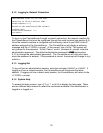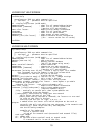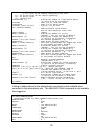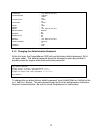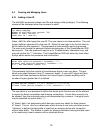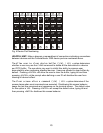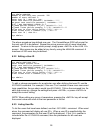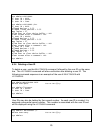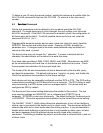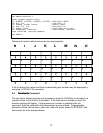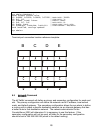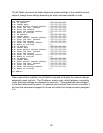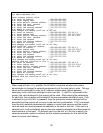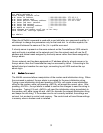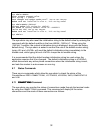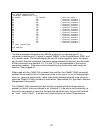26
To delete a user ID using the record number, specify the number as a qualifier after the
DELETEUSER command in the form DELETEUSER /N, where N is the user record
number.
6.3 Devices
DevicesDevices
Devices Command
Device port parameters must be defined by the sys admin using the DEVICES
command. If a single device port is to be changed, the port number must follow the
DEVICES command. If the DEVICES command is entered by itself, the configuration of
all device ports will be listed. To edit all possible device ports for a unit, enter the
command DEVICES /ALL.
Programmable elements include: device name, baud rate, stop bits, parity, data bits,
DCE/DTE, flow control and inhibit direct mode. Pressing <ENTER> accepts the
parameter as is. If changes need to be made, each parameter may be edited as it
comes up after each > prompt.
The device name may not contain the * character. If a name is entered with this
character, the administrator will be asked to re-enter the name.
Four baud rates are offered: 9600, 19200, 38400, and 57600. Most devices use 9600
as the console/admin port baud rate, so the device port defaults to this value. Check
the equipment documentation for the proper baud rate.
The format of the bit-wise transmission of data is determined by the stop bits, parity,
and data bits parameters. The default settings are 1 stop bit, no parity, and 8 data bits.
Check the equipment documentation for the proper settings.
Each device port may be separately configured as either DCE or DTE. The DCE setting
is used when connecting to a DTE device such as a computer. The DTE setting is used
when connecting to a DCE device such as a managed switch. The device ports are
configured as DCE by default.
The device port flow control setting determines the method of flow control. The two
most common settings are XON/XOFF (a.k.a. software) and RTS/CTS (a.k.a.
hardware). DTR/DSR is used very infrequently. The default setting for the device ports
is XON/XOFF. Check the equipment documentation for the correct flow control setting.
The INHIBIT DIRECT MODE setting allows the administrator to turn off port buffering
while a user is connected to the device and is in direct mode. The device port buffer still
collects data while not in direct mode when this setting is active. It may be desirable to
disable direct mode buffering so sensitive data is not viewable by other users, but alert
and panic messages from the attached device are still stored when nobody is
connected. This setting is disabled by default, so buffer data is collected both in and out
of direct mode.



